Former squatters are helping Amsterdam repurpose vacant buildings into cheap offices
How do you stop rising rents from killing creativity in a city? In an unusual marriage between counter-culture and bureaucracy, the city of Amsterdam has found its solution in squatters.
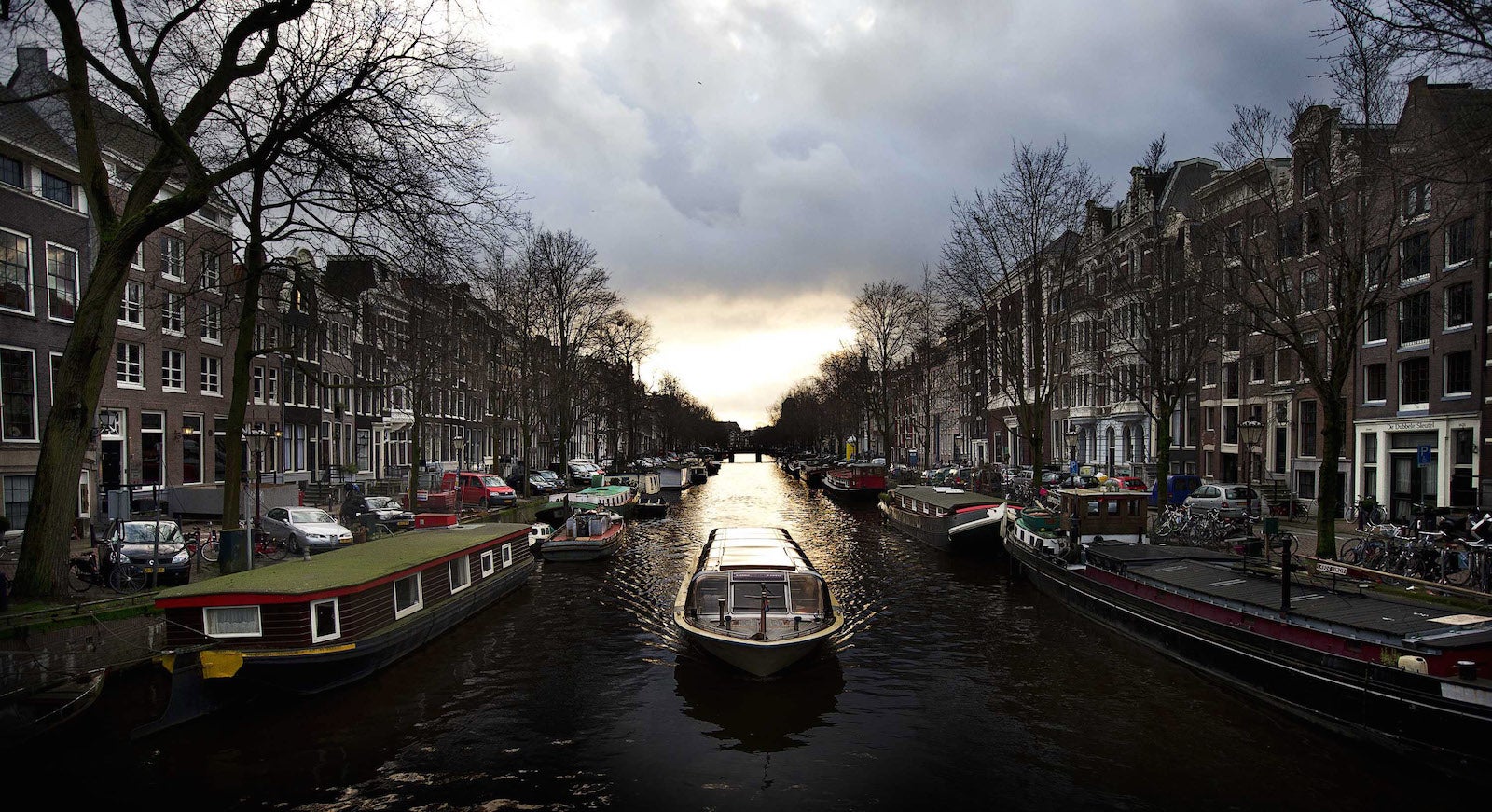

How do you stop rising rents from killing creativity in a city? In an unusual marriage between counter-culture and bureaucracy, the city of Amsterdam has found its solution in squatters.
Amsterdam’s Bureau Broedplaatsen, or “incubator bureau”, helps would-be squatters transform vacant buildings into live/work spaces for artists and entrepreneurs. By allowing the free take-over of former schools and office buildings, as well as a floating factory, a church and even a war bunker, the city has breathed new life into neglected parts of the city.
At a time when rents are skyrocketing in cities such as London, San Francisco and Paris, pushing out the kinds of people that initially made them exciting places to live, vacant buildings are an affront. In the past, Amsterdam’s squatting scene enabled it to hold onto creative talents and gain a reputation as a free-thinking and liberal city. Squats were treated with typical Dutch tolerance until the mid-1990s, when a conservative government enacted a series of high-profile evictions. After a civic backlash, city hall set up an incubation bureau in 2000 to take over the function that squats had served: making use of vacant buildings and allowing musicians, artists, dancers and fresh graduates to blossom, unshackled from the pressure of high rents.
The bureau works like this: people looking for space find a vacant building and bring it to the bureau’s attention. The bureau then mediates between them and the owner to decide on a leasing period, depending on the owner’s intentions to sell, demolish or renovate the building in the future. Applicants must create a business plan, showing how they will generate money to cover costs. Once the bureau has approved the plan, it awards an annual grant of €25 per sqm per year for renovation, and then leaves applicants to get on with renovating, managing and maintaining the space.
Between 2000 to 2015, the bureau invested €40 million to facilitate the creation of over 60 incubators. The city has seen immeasurable returns in the form of cultural, social and economic profit. Start-ups that were founded in the buildings have gone on to hire dozens people and set up swanky offices on the waterfront; the brain drain from arts universities has been stemmed; and the underdeveloped east, west and north areas of the city have become more vibrant, attracting new businesses and visitors.
But it wasn’t all smooth sailing. The bureau initially faced criticism from artists, activists and journalists who accused the government of co-opting the squat movement for their own profit and turning an organic, grassroot culture into a centrally organised, top-down process that strangled creativity rather than encouraging it.
In 2006, the senior project manager at the bureau, Jaap Schoufour, realised the bureau could face closure if it didn’t win the public’s support. He contacted economist Fred Stammeshaus and sociologist Eric Duivenvoorden, both former squatters, for help. There were two problems: firstly, bureaucrats did not have a network of creative people to draw upon, and secondly, inexperienced applicants had struggled with renovation, applying for licences, and turning a profit on their incubators.
Stammeshaus and Duivenvoorden decided to set up a professional organization, named Urban Resort, to draw on their roots in the squat movement to provide both the creative network and expertise in setting up creative live/work spaces. Urban Resort has now created 10 incubators in partnership with city hall.
“The people who work in the city council know squatters and artists, they have been squatters themselves. Of course they sympathize with subculture,” says Schoufour.
Urban Resort masterminded one of the most successful and well-known incubator to date: the Volkskrant building on Amsterdam’s east bank. Home to one of the Netherlands’ biggest newspapers for 42 years before falling into disrepair, the building was transformed into a creative incubator for artists and small businesses in 2007. With a restaurant and bar on the top floor, it became one of the hottest spots in the city and contributed to the regeneration of the east side of Amsterdam, with new shops, cafes and restaurants popping up around it.
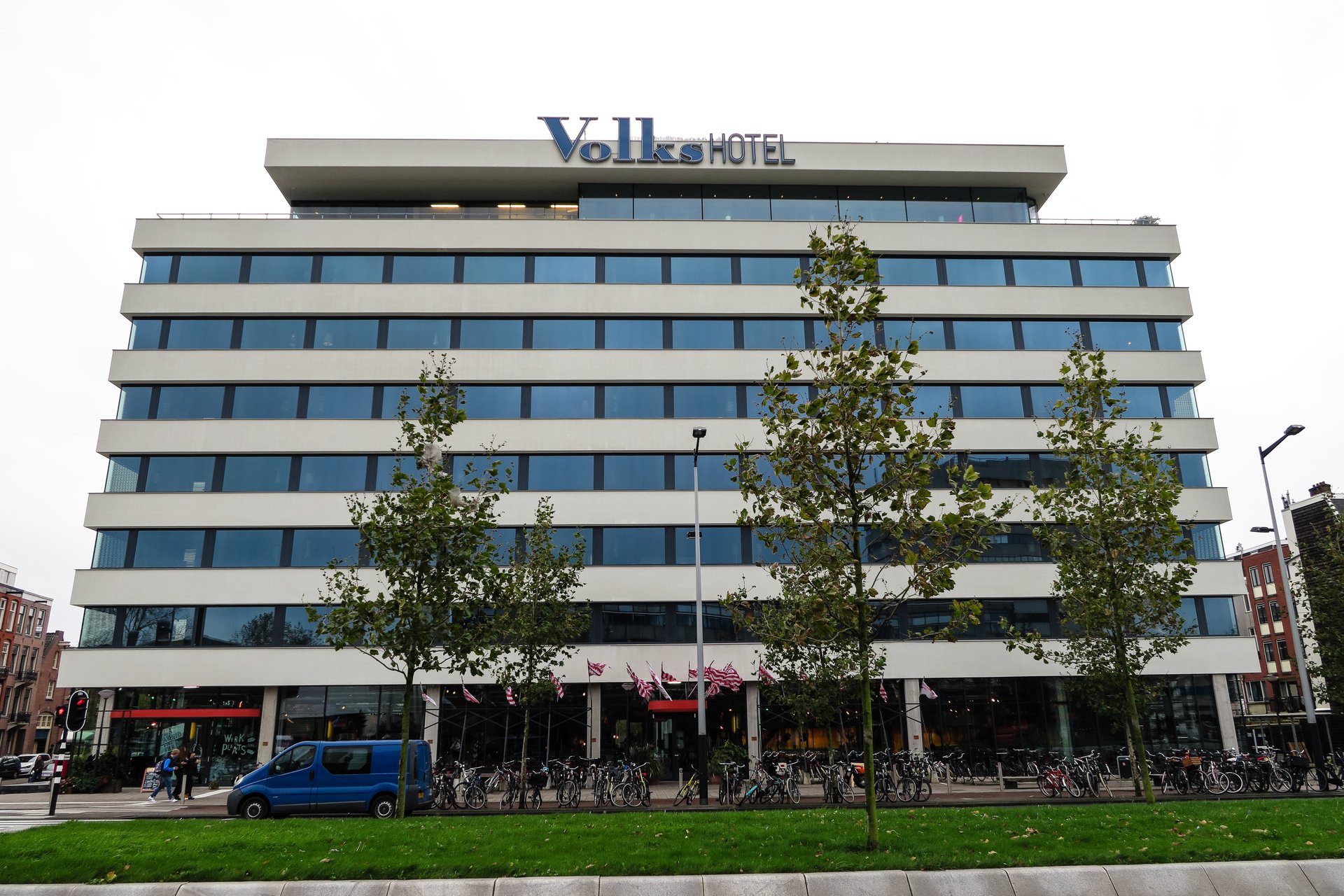
After the lease ended in 2013, the incubator studios moved to the back of the building, and the rest of the space was converted into a hotel with a restaurant and cafe, as well as a cocktail bar in the basement. Some successful graduates of the incubator moved out to bigger offices, including the Amsterdam branch of Startupbootcamp, which now employs more than 50 people.
Other successful incubators include the Bonte Zwaan, a floating office in the timber yards in the north of the city, WOW, a collection of studios for artists-in-residence connected to a gallery, lecture hall and hostel for visitors, and Podium Mozaiek, a multicultural arts performing centre in an old church building.
The bureau has not been able to fill all vacant buildings in the city, however. Property owners, wary of having their buildings squatted, still often turn to “anti-squat” or “vacancy management” agencies to find short-term tenants who sign a contract saying they will vacate the premises when there is a decision to sell, renovate or demolish the building.
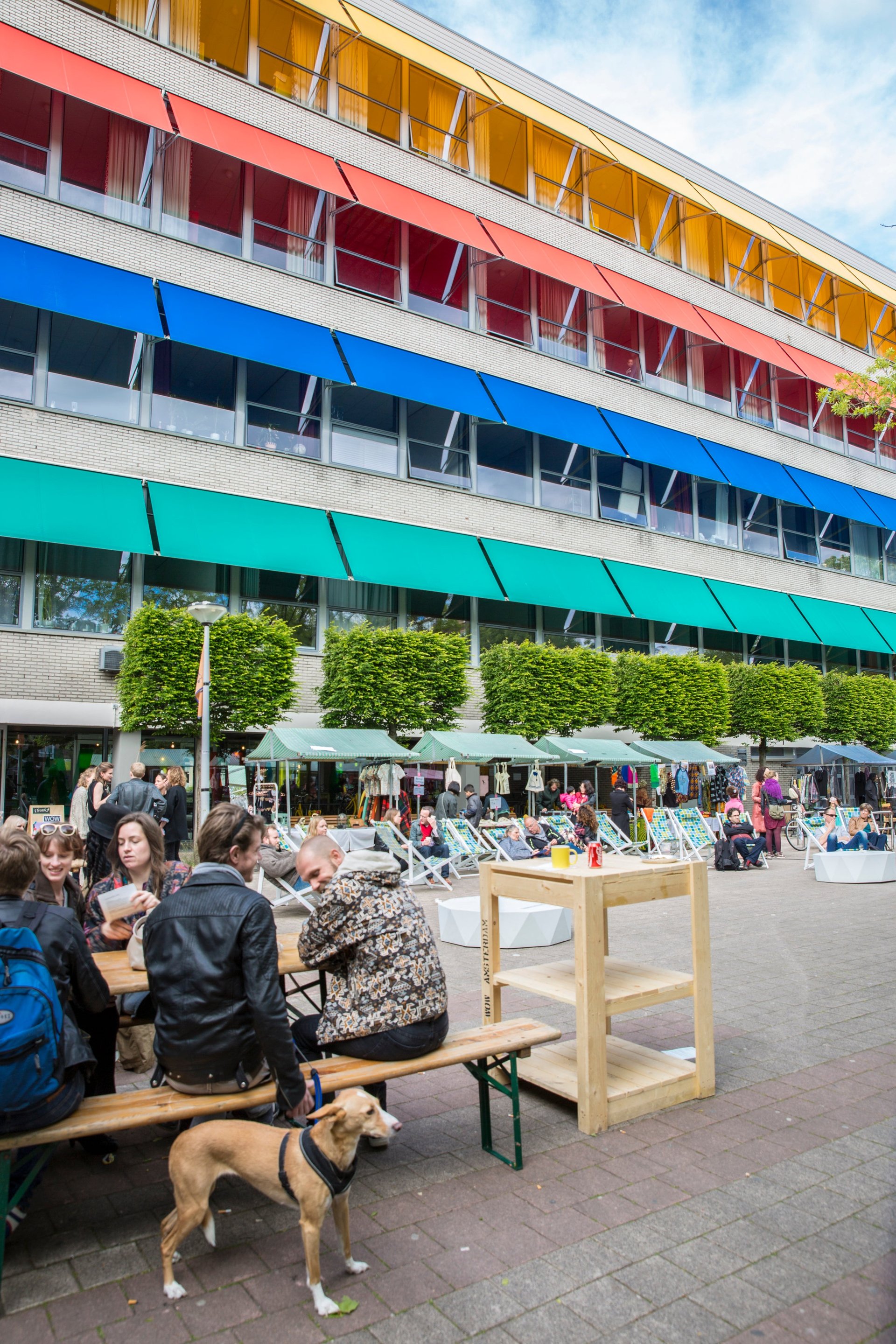
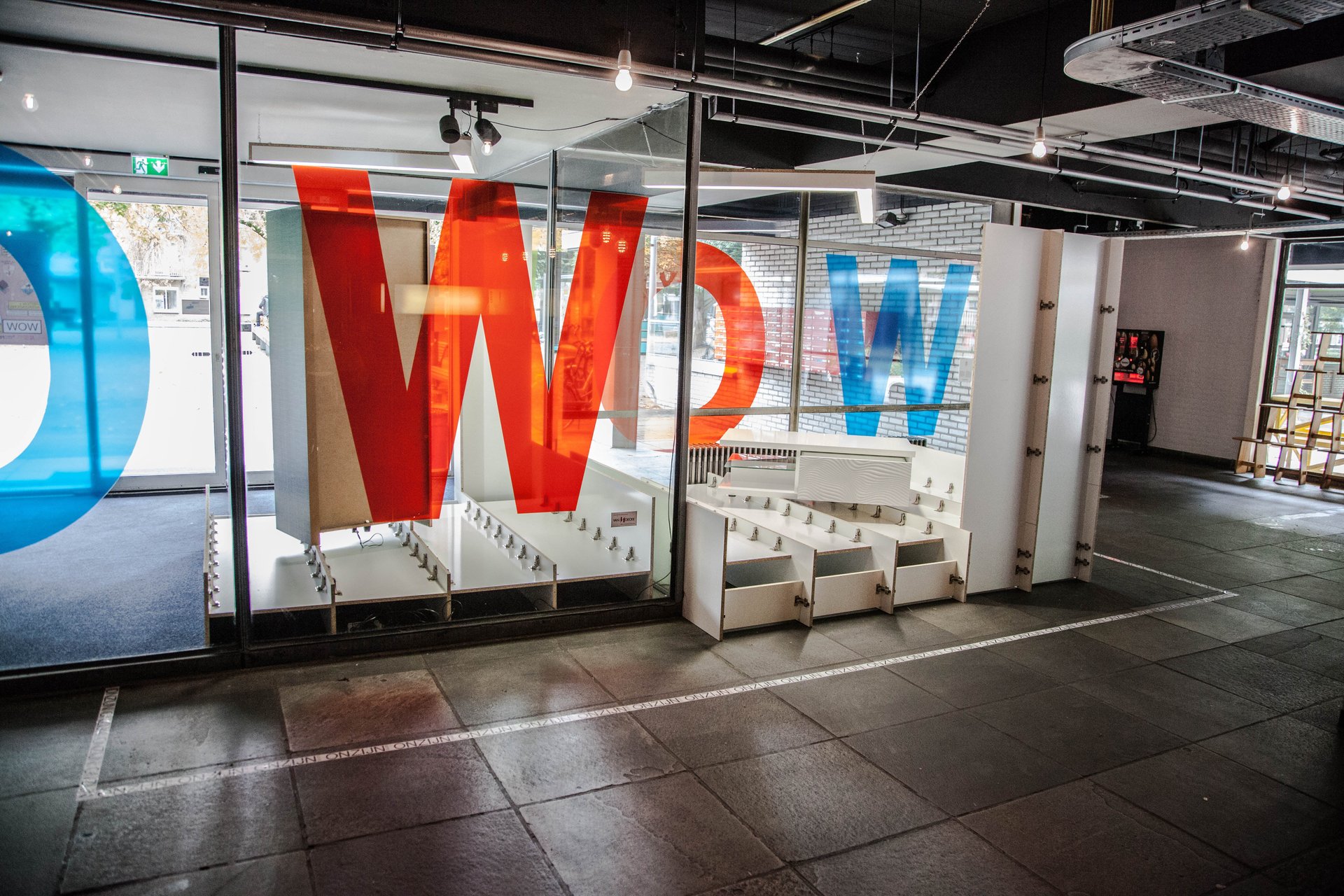
Urban Resort and its network say that vacancy management agencies greatly underutilize space, often placing just four people in a building of 10,000 sqm for the sake of having it “occupied” in the eyes of Dutch law. The building is often poorly maintained, or not at all, because the short term tenants do not care and the companies are not held responsible.
So Urban Resort and three similar organizations decided to join forces and find an alternative to the anti-squat industry. They wanted to show city hall it was possible to creatively use buildings on extremely short leases—which can’t be turned into incubators, as city hall requires them to have a lease of several years—while maximising economic and social returns for both the building and the surrounding area. The result is a consortium called LOLA, which stands for “Vacancy Solvers Amsterdam” in Dutch.
The consortium’s pilot project, a transformed school called Lola Luid that lies to the west of Amsterdam’s Rembrandt park, is now home to 63 entrepreneurs and organisations ranging from a pickle maker to a political party. The once dusty gym is now a cacophony of whooping neighborhood children, while the brightly colored atrium is filled with locals chatting over tea.
“The difference between us and the other incubators is that we are open Tuesday to Sunday and we’re a public space, you can come in, there’s stuff to do. Other incubators are rather closed. They have a waiting list policy and have to do it fairly,” says Emilie Kröner, who manages Lola Luid with her husband Bart van Heesch. “Whereas we carefully selected the people and wanted to make it as diverse as possible and get everyone in—old, young, poor, rich, Dutch native, Moroccan. I think we are rather good at bringing all of those together.”
Lola Luid now has a bicycle shop, a yoga space, galleries, a lunchroom, a hairdresser and a beauty salon. Nearly all of the shop owners are starting out in their career. One woman sells secondhand shoes, having set up an online shop in her bedroom and then needing somewhere for people to try on the shoes. Kröner and van Heesch found Ahmed Katouss, a budding bicycle mechanic, fixing people’s bikes on the street and offered him the basement space to get his business going.
“Because of the rents in Amsterdam, we simply had no other options to set up our business,” says Markus Praat, one half of the New Chique Agency and Gallery that occupy one of the classrooms in Lola Luid. Praat and his business partner Bobby Vulto set up an online gallery to match emerging artists with people who want to buy art, but don’t have a huge budget.
Because Lola Luid is not an incubator, it received no funding from the city to set up. Instead, Kröner and van Heesch manage the finances, using the money paid by entrepreneurs to use the rooms (they can’t call it rent because that would give them certain rights and suggest long-term occupancy) to pay for repairs and maintenance. Hiring out the theatre and gym spaces brings in money to put on events, such as a monthly percussion night.
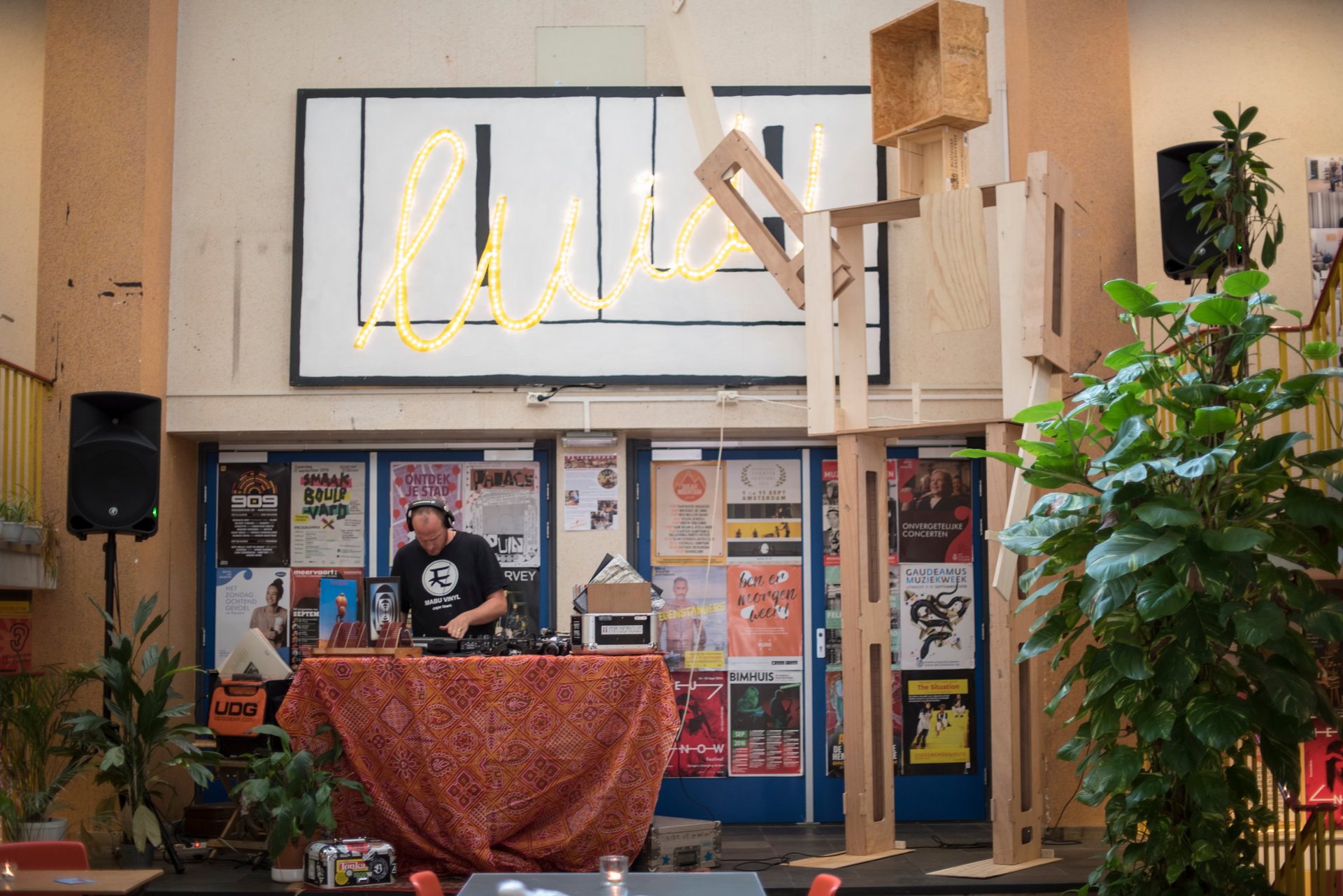
In fact, Lola Luid is saving the city money. An empty school would cost city hall €200,000 per year in maintenance costs and to keep the heating on during the winter to prevent the pipes from freezing over. Van Heesch, a product designer and an all-round handyman, managed to save the city €7,000 in just a few months by manually controlling the heating.
“The incubators need to be perfect when it comes to rules, because they’re funded by the government, so they invest a lot of money into the building to make that no one can burn their hands and so on. But that kills creativity. So we use the empty buildings as they are and we try to be as careful as possible to have optimal safety in the building,” says van Heesch.
Complaints about city hall’s rules—about health and safety, the need to turn out a profit, or the requirement for artists and tenants to make a contribution to their neighborhood in lieu of social services—are common. A government agency will never handle vacant space in the way that squatters once did. But for a marriage between opposites—bureaucrats and squatters—Amsterdam isn’t doing too badly. That may be because officials understand the value of counter-culture for creativity.
Schoufour says he encountered quite a different view after he visited a squat in Milan while attending a conference.
“There was a group of fantastic guys, very ideology-driven, anti-globalism and so on. They said to the city council, ‘We’ve squatted your property but we’ll show you how we can work together by renovating your building in an alternative way. We invite people from all over the world during summertime each year and we offer them a free meal and a place to sleep.’ In return they were working on improving the building. After three years, the building looked fantastic, since 60 people worked there during three summers,” he says.
His counterparts in Milan’s local government were horrified.
“They looked at me as if I had gone mad to talk to these squatters: ‘You have been in criminal circles, you can’t talk about this’… Whereas squat culture is part of Amsterdam. If you deny squat culture it’s a way of denying Amsterdam.”